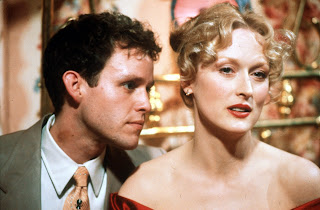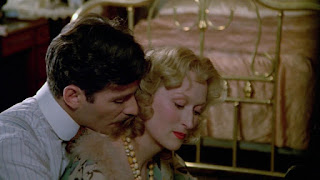Two years after the end of World War Two, aspiring writer Stingo (Peter MacNicol) moves from the South to an apartment in Brooklyn. He meets his lively and loud upstairs neighbours, Polish immigrant Sophie Zawistowski (Streep) and her lover Nathan Landau (Kevin Kline), a Jewish biologist. The couple's relationship is tumultuous due to Nathan's wild mood swings and descents into fits of unwarranted jealousy.
Although she comes from a Catholic family, Sophie is a survivor of the Auschwitz Nazi concentration camp. After the war, Nathan and his brother, a doctor, helped her recover from malnutrition. As Stingo makes progress on his book, he develops a deep friendship bordering on love with both Sophie and Nathan. Gradually Sophie reveals her family's harrowing wartime experiences, while Stingo also discovers Nathan's secrets.
An adaptation of the book by William Styron directed by Alan J. Pakula, Sophie's Choice combines a troubled companionship triangle with heartrending flashbacks to wartime in Poland. The overarching theme addresses the far-reaching impacts of emotional and mental damage whether acknowledged or denied, the search for recovery and happiness buffeted by overwhelming dark forces.
The weighty subject matter does deserve considerate treatment, but the film clocks in at an inexcusable 151 minutes, and spends far too much time on the Brooklyn scenes. The pacing often slows to a crawl, Pakula conflating sombre moods with the need to overindulge.Fortunately the director is rescued by his leading actress. Meryl Streep delivers one of the most affecting performances in cinema's history, combining a Polish accent for the Brooklyn scenes with speaking in German for the flashbacks. But more critically, she conveys complex fragility and uses the faintest of expressions to hint at painful scars, omissions, and the lies Sophie has told herself just to survive. Whenever Streep is on the screen nothing else matters, her presence eradicating the plodding plot.
In his big screen debut, Kevin Kline is more broad as the erratic Nathan, full of vivacious energy and overrun by mood swings. Peter MacNicol is caught in the thankless narrator/observer/listener role, and predictably disappears into the wallpaper.
The revelations both past and present come tumbling out in the final hour, the scenes at Auschwitz soaring and hinting at the potential for a magnificent movie had the wartime events dominated. As it stands, the resonance of Sophie's experience is diluted by a barely-there backstory about her family and role as mother. Despite a yawning imbalance in narrative thrust, Sophie's Choice serves as a scintillating actress showcase, and a demonstration of a multi-generational talent in peak form.
All Ace Black Movie Blog reviews are here.




No comments:
Post a Comment
We welcome reader comments about this post.